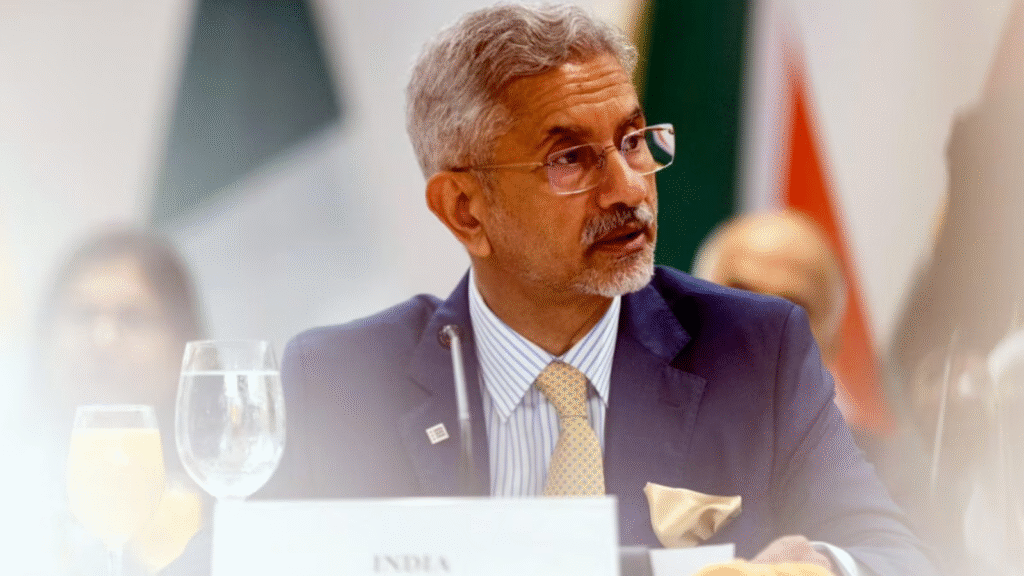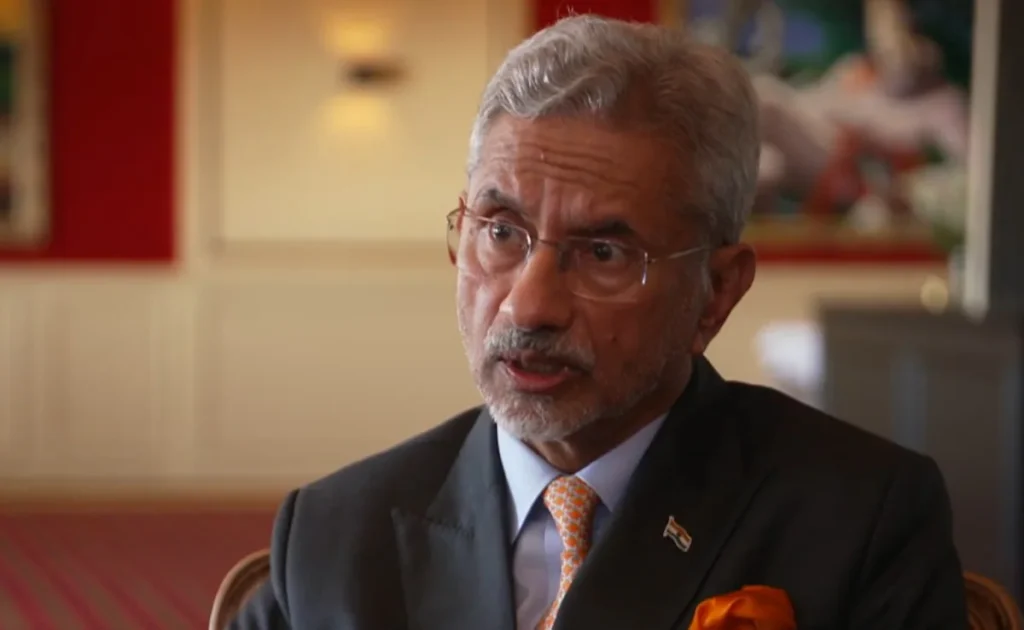
India’s External Affairs Minister, Dr. S. Jaishankar, recently made headlines with a firm and unequivocal response to the Congress party’s allegations concerning the government’s handling of information following Operation Sindoor. This military action targeted terror hubs across the border in Pakistan, delivering a critical blow to terrorist infrastructure believed to threaten India’s national security. The opposition Congress party claimed that the government failed to inform Pakistan or the public adequately, raising questions about transparency and accountability.
In response, Jaishankar labeled these accusations as “dishonest,” affirming that Pakistan was informed through appropriate diplomatic channels after the operation. His statements not only clarified India’s position but also exposed the political motivations behind the opposition’s claims. This episode reflects the intricate balance India must maintain between military decisiveness, diplomatic prudence, and political discourse.
Operation Sindoor: Context and Execution of a Precision Strike
To understand the significance of Jaishankar’s statements and the controversy surrounding Operation Sindoor, it is essential to delve into the background of the operation itself. Terrorism has long been a pressing security challenge for India, with repeated attacks originating from across the western border. Over the years, India has strengthened its counterterrorism apparatus, emphasizing intelligence, surveillance, and targeted military actions.
Operation Sindoor was launched following credible intelligence inputs about imminent terrorist plans to target Indian civilians and security forces. It was a meticulously planned operation aimed at neutralizing terror camps entrenched in Pakistan-administered territories. The operation’s success hinged on precise execution and swift action, minimizing collateral damage while maximizing impact on terrorist infrastructure.
The strikes dismantled key terror facilities and sent a clear signal that India’s response to terrorism would be swift and unrelenting. The operation was lauded by many security experts as a significant step in India’s counterterrorism strategy, reinforcing the country’s commitment to protect its borders and citizens.
The Political Fallout: Congress Allegations and Media Frenzy
Soon after the operation became public knowledge, the Congress party accused the ruling government of withholding crucial information from the public and international community. The opposition suggested that the government’s failure to promptly inform Pakistan could escalate tensions unnecessarily and fuel instability in the region.
Media outlets extensively covered these claims, sparking widespread debate and political backlash. The allegations also stirred public anxiety over the government’s transparency and the potential diplomatic fallout. Many questioned whether the government’s communication strategy was adequate or if it risked damaging India’s credibility on the international stage.
However, the government maintained a measured silence initially, adhering to national security protocols that often restrict the flow of operational details. This silence was interpreted by some as secrecy, which the opposition seized upon to frame their criticism.
Jaishankar’s Rebuttal: Clarity Amidst Confusion
Against this backdrop, External Affairs Minister S. Jaishankar broke his silence to address these issues head-on. In a series of public statements and media interactions, he categorically denied the opposition’s claims, asserting that Pakistan was informed about the strikes after Operation Sindoor had been successfully carried out.
Jaishankar emphasized that informing Pakistan was part of standard diplomatic protocol aimed at preventing unintended escalation. He elaborated that such communication does not signal weakness but reflects India’s responsibility as a sovereign nation committed to measured statecraft.
Calling the Congress narrative “dishonest,” Jaishankar accused the opposition of distorting facts to score political points. He highlighted the dangers of politicizing national security issues and the potential harm such misinformation causes to the country’s unity and international standing.
His remarks underscored the government’s confidence in its actions and reinforced the message that national security decisions are taken with utmost seriousness and strategic forethought.
Diplomacy in Times of Conflict: The Importance of Post-Strike Communication
One of the most important revelations from Jaishankar’s statement is the confirmation that Pakistan was informed through diplomatic channels after Operation Sindoor. This sheds light on a crucial, yet often overlooked, aspect of military operations—managing bilateral relations during conflict.
Post-strike communication serves multiple purposes. It prevents accidental military escalations, reassures the international community, and preserves channels for potential future dialogue. Informing an adversary after a military strike is a demonstration of responsible state behavior, signaling that while military action may be necessary, dialogue and diplomacy remain priorities.
India’s approach in this case reflects a nuanced understanding of conflict management. It shows a willingness to combine military strength with diplomatic engagement, a balancing act that is essential for long-term peace and stability in the region.
Historical Context: India-Pakistan Relations and Terrorism
The backdrop to Operation Sindoor is the long and fraught history of India-Pakistan relations. Since partition in 1947, the two countries have experienced multiple wars, continuous border skirmishes, and a deeply entrenched mistrust, exacerbated by cross-border terrorism.
Terrorism has been a persistent challenge, with groups operating from Pakistani territory conducting attacks on Indian soil. India has consistently demanded Pakistan take decisive action against these groups. In recent decades, India’s response has evolved from diplomatic protests and retaliatory strikes to more preemptive and precise military operations.
Operation Sindoor fits into this continuum of strategic responses. It represents not only a tactical victory but also a shift toward greater operational assertiveness. India’s decision to inform Pakistan post-strike is a reflection of the complex diplomacy required in a region where hostility and dialogue coexist uneasily.
Political Landscape: National Security as a Battleground
The controversy around Operation Sindoor also exposes the politicization of national security in India. Security matters, particularly those involving Pakistan and terrorism, evoke strong emotions and often become tools in political contests.
The Congress party’s allegations, while part of political discourse, underscore the delicate nature of handling such issues. Governments need to act decisively while maintaining transparency, but opposition parties also bear the responsibility to avoid undermining national unity with unfounded claims.
Jaishankar’s sharp criticism of Congress points to the high stakes involved. National security is not merely a policy area but a vital element of the nation’s identity and integrity. Political debates must therefore be anchored in facts and constructive engagement rather than sensationalism.
Impact on India’s Counterterrorism Strategy
Operation Sindoor is emblematic of India’s evolving counterterrorism strategy, which integrates intelligence, diplomacy, and military power. By targeting terror camps with precision strikes and immediately communicating post-operation, India demonstrates a sophisticated approach to combatting terrorism.
This approach sends multiple signals—to terrorists, adversaries, allies, and the international community—that India is serious about its security while respecting diplomatic norms. The operation’s success disrupts terror networks and potentially deters future attacks.
India’s strategy also includes engaging international partners to isolate terrorist groups globally, reinforcing the message that terrorism cannot be tolerated or supported under any guise.
Subheading: The Role of Media in Shaping Public Perception
Media coverage has played a critical role in shaping public understanding of Operation Sindoor and the subsequent political controversy. The rapid dissemination of information and opinions often blurs the line between facts and speculation.
While a free press is vital to democracy, the responsibility to report accurately and avoid sensationalism is equally important, especially on sensitive security matters. In the case of Operation Sindoor, premature or incomplete information fed into the opposition’s narrative and created confusion.
The government’s challenge lies in managing this information environment—providing timely, accurate updates without compromising operational security. Jaishankar’s public clarifications can be seen as part of this effort to set the record straight and restore public confidence.
The interaction between media, political parties, and government highlights the complexities of democratic communication in an era of 24/7 news cycles and social media amplification.
Strategic Messaging: Balancing Transparency and Security
Transparency in governance fosters trust, but in matters of national security, complete disclosure is neither feasible nor prudent. India’s handling of Operation Sindoor reflects this delicate balance.
By confirming that Pakistan was informed after the operation, the government demonstrates accountability. At the same time, withholding detailed operational specifics protects intelligence sources, tactical methods, and diplomatic strategies.
Jaishankar’s communication strategy emphasizes this balance. His directness counters misinformation while reinforcing that the government remains committed to protecting national interests with a judicious mix of openness and discretion.
Such strategic messaging is essential to maintain both domestic support and international credibility, particularly in conflict-prone regions.
Indo-Pak Relations: Navigating a Fragile Peace
The aftermath of Operation Sindoor highlights the fragile nature of India-Pakistan relations. Despite the military strike, India’s decision to inform Pakistan signals a desire to avoid uncontrolled escalation.
This approach is critical given the nuclear capabilities of both nations and the history of multiple conflicts. It also opens possibilities for future dialogue, confidence-building measures, and diplomatic engagement.
India’s emphasis on holding Pakistan accountable for terror groups operating from its soil remains central to its policy. The operation and subsequent communication put pressure on Pakistan to act, while keeping diplomatic channels open to prevent further deterioration.
The Broader Geopolitical Implications
India’s assertive yet diplomatic approach has broader geopolitical ramifications. It reassures India’s neighbors and international partners of its commitment to regional stability while signaling resolve against terrorism.
India’s balancing act between military strength and diplomacy also enhances its global image as a responsible power. This is vital in an era of complex international relations where India seeks to expand its influence and partnerships.
Furthermore, the operation and communication strategy underscore India’s capability to protect its sovereignty without alienating key stakeholders.
Subheading: The Path Forward for India’s Security and Diplomacy
Looking ahead, India’s experience with Operation Sindoor offers valuable lessons for managing security threats and diplomatic relations. The government’s ability to conduct targeted operations, communicate effectively, and navigate political challenges will shape future policies.
National security demands coordination among military, intelligence, diplomatic, and political spheres. India’s model of integrating these dimensions while maintaining transparency where possible strengthens its defense posture.
Political parties and media must also engage responsibly, recognizing that national security transcends partisan interests. Constructive debate should reinforce rather than undermine India’s strategic goals.
Ultimately, India’s success depends on sustained vigilance, strategic clarity, and unity in addressing complex security challenges.
Conclusion
The controversy surrounding Operation Sindoor and Jaishankar’s response epitomizes the challenges India faces at the intersection of security, diplomacy, and politics. By confirming that Pakistan was informed post-strike, Jaishankar dispelled misinformation and asserted India’s responsible approach to statecraft.
Operation Sindoor itself stands as a significant milestone in India’s fight against terrorism, combining military precision with diplomatic prudence. The government’s handling of the aftermath highlights the importance of strategic communication and political maturity.
As India continues to navigate a turbulent geopolitical landscape, the lessons from this episode will be crucial in shaping a resilient, confident, and united national security framework. National security remains a shared responsibility, requiring collaboration and truthfulness from all stakeholders to safeguard the country’s future.

